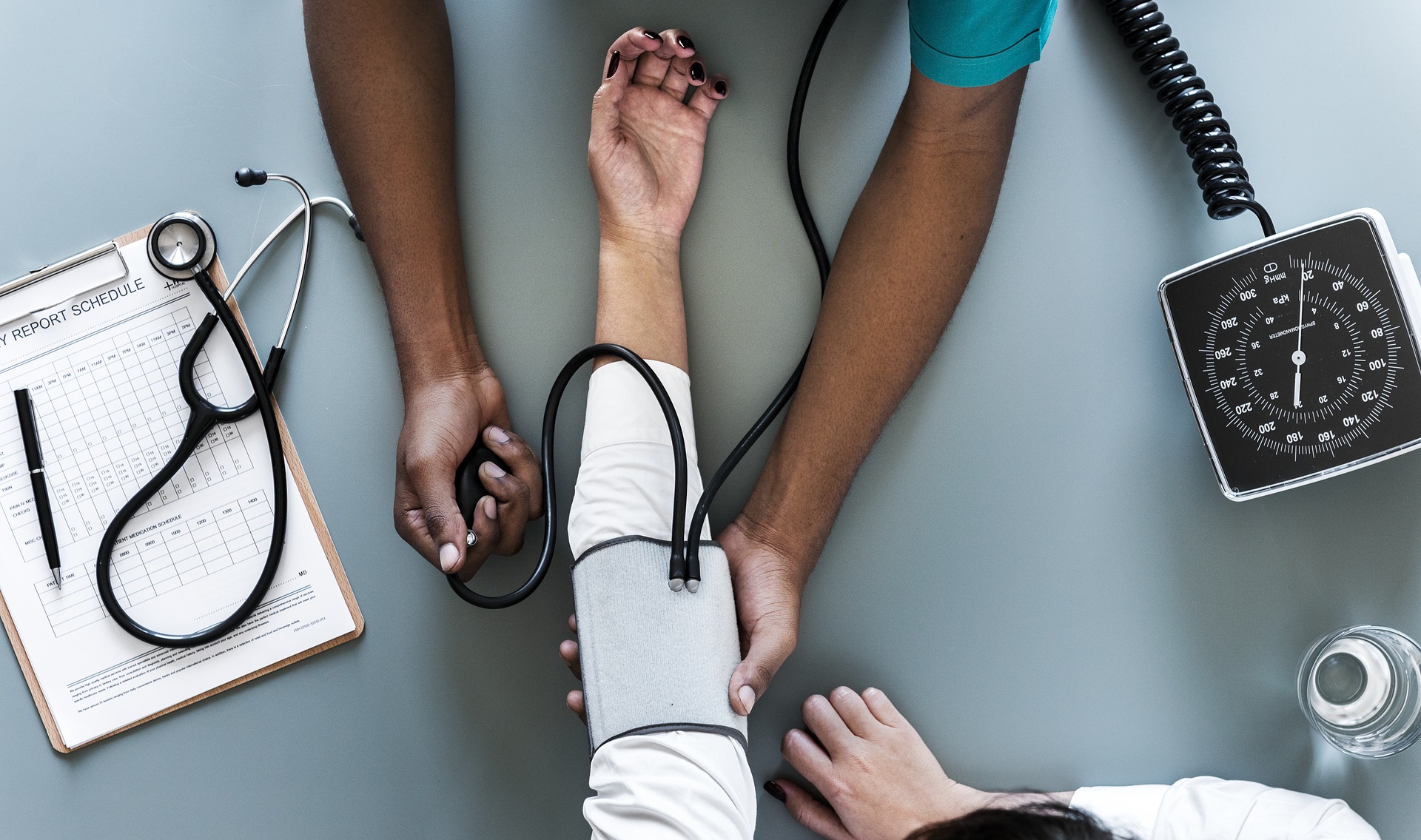Essential Spanish Health Vocabulary To Handle Medical Situations

Get our free email course, Shortcut to Conversational.
Have conversations faster, understand people when they speak fast, and other tested tips to learn faster.
More infoPlanning to travel to a Spanish speaking country? If so, then it’s always a good idea to learn the most common Spanish health vocabulary, should you find yourself in a situation where you need to speak to a doctor, or require some kind of medical assistance.
(ps, we covered some additional Spanish emergency phrases here)
Body Parts in Spanish
The first thing you need to master is the Spanish vocabulary for body parts.
| English | Spanish |
| Head | La cabeza |
| Face | La cara |
| Eye | El ojo |
| Nose | La nariz |
| Ear | El oído (if the pain is outside, then, la oreja) |
| Mouth | La boca |
| Tooth | El diente |
| Molar | La muela |
| Tongue | La lengua |
| Throat | La garganta |
| Neck | El cuello |
| Shoulder | El hombro |
| Arm | El brazo |
| Elbow | El codo |
| Hand | La mano |
| Wrist | La muñeca |
| Finger | El dedo de la mano |
| Toe | El dedo del pié |
| Nail | La uña |
| Back | La espalda |
| Lower back | La lumbar |
| Hip | La cadera |
| Leg | La pierna |
| Knee | La rodilla |
| Ankle | El tobillo |
| Foot | El pie |
| Skin | La piel |
| Bone | El hueso |
And now, the internal parts.
| English | Spanish |
| Muscle | El músculo |
| Blood | La sangre |
| Lung | El pulmón |
| Heart | El corazón |
| Liver | El hígado |
| Appendix | El apéndice |
| Intestine | El intestino |
| Bladder | La vejiga |
| Gallbladder | La vesícula |
| Kidney | El riñón |
Spanish Vocab For Common Illnesses
The below vocab relates to the most common illnesses – from a mild stomach bug, to the more serious stuff.
| English | Spanish |
| Stomachache | Dolor de estómago |
| Headache | Dolor de cabeza |
| Backache | Dolor de espalda |
| Earache | Dolor de oído |
| Toothache | Dolor de muela |
| Sore throat | Dolor de garganta |
| Cold | Resfriado |
| Flu | Gripe |
| Pneumonia | Neumonía |
| Sunstroke | Insolación |
| Heart attack | Infarto / Ataque cardíaco |
| Ictus | ACV |
| High Blood Pressure | Hipertensión |
| Low Blood Pressure | Hipotensión |
| Diabetes | Diabetes |
| Hypoglycemic | Hipoglicémico |
Spanish Vocab For Common Symptoms
You’ll need to know how to describe the symptoms that you are feeling.
Let’s start with some important adjectives to memorize.
(remember, most Spanish adjectives require you to change the last letter, depending on the gender of the noun)
General Symptoms
| English | Spanish |
| Swollen | Inflamado/a |
| Sensitive | Sensible |
| In pain or sore | Dolorido/a |
| Irritated | Irritado/a |
| Fever | Fiebre |
| In pain or sore | Adolorido(a) |
| Irritated | Irritado(a) |
| Itchy | Comezón/Picazón |
| Bleeding | Sangrante /sangrado |
| Open wound | Herida abierta |
| Broken (a bone) | Roto / Fracturado |
| Bruised | Golpeado /Lastimado |
| Accelerated heart-beat | Latidos acelerados |
| Arrhythmia | Arritmia |
| Slur | Hablar con dificultad |
| Unconsciousness | Inconsciente |
| Dizziness | Mareo |
| Nausea | Náuseas |
| Burn | Quemada/quemadura |
| Cut | Cortada |
Colds and Allergy Symptoms
This section is especially important if you suffer from allergies.
| English | Spanish |
| I have a runny nose | Tengo la nariz aguada / Tengo la nariz tapada y mocosa. |
| I have watery eyes | Tengo los ojos llorosos. |
| I have a runny nose | Tengo la nariz aguada / Tengo la nariz tapada y mocosa. |
| I have itchy eyes | Tengo picor en los ojos / Los ojos me pican |
| My eyes burn | Me arden los ojos. |
| My skin burns | Me arde la piel |
| Hoarseness | Carraspera / Ronquera |
| I have a frog in the throat | Tengo carraspera |
| I am hoarse | Estoy ronco. |
| I am aphonnic | Estoy afónico |
| Sneeze | Estornudar |
Food Poisoning Symptoms
Not to be overly pessimistic, but if you’re visiting certain countries, then you may need this vocabulary at some point.
| English | Spanish |
| My stomach is burning | Me arde el estómago. |
| I have an upset stomach | Tengo el estómago revuelto. |
| I want/need to throw up | Quiero/Necesito vomitar. |
| I need to use the toilet/bathroom | Necesito ir al baño. |
| I have a bitter taste in my mouth | Siento un sabor amargo en la boca. |
| My tongue is swollen | Tengo la lengua inflamada |
| I need an antihistamine/antiallergic | Necesito un antialérgico |
| My epinephrine/epipen is in (my pocket) | Mi epinefrina está en (mi bolsillo) |
| I have a rash | Tengo una erupción / Tengo salpullido |
| I am short of breath | No tengo aliento |
| I can’t breath | No puedo respirar / Tengo dificultad para respirar. |
Heat Stroke or Sunstroke Symptoms
| English | Spanish |
| Throbbing headache | Dolor de cabeza punzante |
| Lightheadedness | Aturdimiento o mareo |
| Confusion and/or disorientation | Confusión y/o desorientación mental |
| Lack of sweating despite the heat | Falta de sudor a pesar del calor |
| Red, hot, and dry skin | Piel enrojecida y seca |
| Muscle weakness | Debilidad muscular |
| Cramps | Calambres |
| Staggering | Caminar tambaleante |
| Nausea and vomiting | Náuseas y vómito |
| Rapid heartbeat (strong or weak) | Latido cardíaco acelerado (fuerte o débil) |
| Rapid, shallow breathing | Respiración rápida y superficial |
| Seizures | Convulsiones |
| Unconsciousness | Perder el sentido/Quedar inconsciente |
| Dry diaper after several hours (in the case of infants) | Pañal seco luego de varias horas puesto (en caso de niños) |
| Few urinations (in the case of older children or adults) | Pocas micciones (en caso de niños más grandes o adultos) |
Migraine Symptoms
| English | Spanish |
| Throbbing headache in one particular area of the head | Dolor de cabeza punzante focalizado |
| Nausea | Náuseas |
| Sensitivity to light and sound | Sensibilidad a la luz y al sonido |
.
Anxiety Symptoms
| English | Spanish |
| Increased heart rate | Aumento de la frecuencia cardíaca |
| Breathing rapidly (hyperventilation) | Respiración acelerada (hiperventilación) |
| Sweating | Sudor copioso |
| Shivers | Escalofríos |
| Tremblings | Temblores |
| Tightness/Constriction | Opresión en el pecho |
| Fear or panic | Miedo o pánico |
| Dizziness | Mareos |
| Fainting | Desmayos |
Common Phrases To Express Being Sick
Again, we hope you never have to the below, but it’s worth learning them just in case.
| English | Spanish |
| (I have a) throbbing headache | Se me parte la cabeza del dolor / Tengo un dolor de cabeza punzante. |
| I feel dizzy | Estoy mareado. |
| I want to throw up | Quiero vomitar. |
| My muscles are cramped | Tengo calambres. |
| My heart is beating very fast | Mi corazón está latiendo muy rápido. |
| I think I’m going to faint | Creo que me voy a desmayar. |
| My child/children’s skin is too hot and dry | Mi hijo(a)/hijos(as) tiene(n) la piel muy caliente y roja. |
| My child/children has not peed in a very long time | Mi hijo(a)/hijos(as) no ha(n) ido al baño en muchas horas. |
| My child/husband/friend has passed out | Mi hijo(a)/esposo(a) se desmayó / Mi hijo(a)/esposo(a) perdió el sentido. |
| (I have a) throbbing pain on (my temple) | (Tengo) un punzante dolor (en la sien) |
| I feel nausea | Tengo náuseas. |
| I can’t stand the light (The light hurts my eyes). | No soporto la luz (Me duelen los ojos con la luz). |
| I am sweating | Estoy sudando |
| My hands are sweating | Me sudan las manos |
| My heart is beating very fast | Mi corazón late muy rápido |
| I can’t stand the noise. (The noise makes my head hurt badly). | No soporto el ruido (El ruido hace que me duela más la cabeza). |
| I can’t breath | No puedo respirar |
| I have shivers | Tengo escalofríos |
| I am shaking | Estoy temblando |
| My chest feels tight | Siento una opresión en el pecho |
| I’m in panic! | ¡Tengo pánico! |
| I’m afraid | Tengo miedo |



